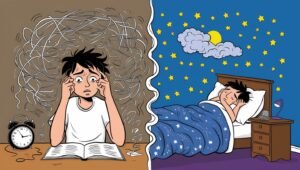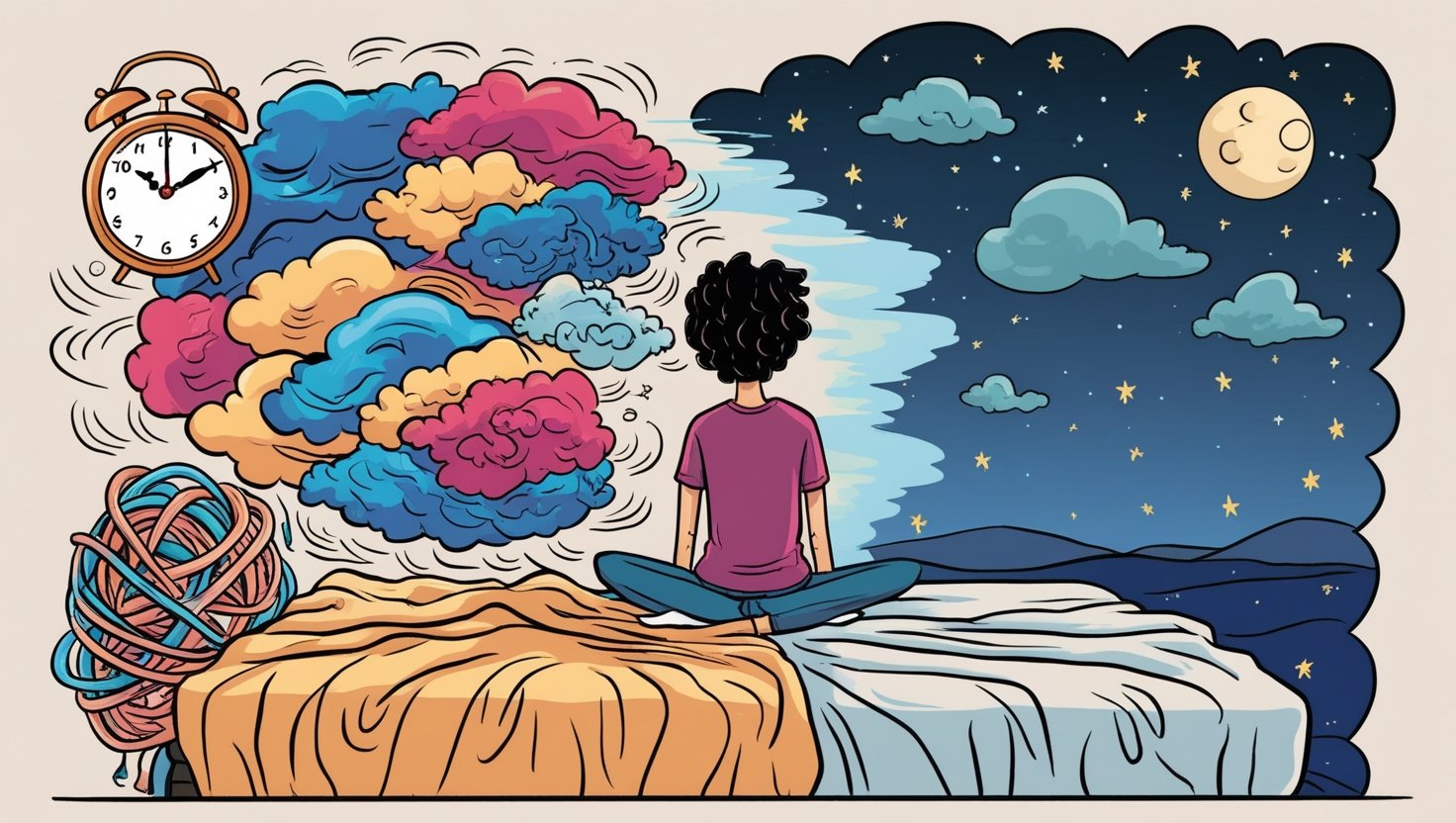Attention Deficit Hyperactivity Disorder (ADHD) is a neurodevelopmental disorder that affects millions of people worldwide. Characterized by symptoms like impulsivity, inattention, and hyperactivity, ADHD can significantly impact daily functioning, both at work and home. However, one of the lesser-discussed yet profoundly influential issues associated with ADHD is sleep disorders.
Many individuals with ADHD experience difficulties falling asleep, staying asleep, or waking up feeling rested. Understanding the connection between ADHD and sleep disorders is critical to improving the quality of life for those affected by this condition.
The Prevalence of Sleep Issues in ADHD
Research shows that between 50% to 75% of individuals with ADHD report some form of sleep disturbance. These issues range from difficulty falling asleep (insomnia) to restless sleep and frequent nighttime awakenings. For many, the challenges of managing ADHD symptoms during the day extend into the night, making it harder to wind down and achieve restful sleep.
Children with ADHD are especially vulnerable to sleep disorders, and as they grow into adulthood, the connection between ADHD and sleep disturbances often persists, contributing to emotional, cognitive, and physical health problems.
Why Does ADHD Affect Sleep?
The link between ADHD and sleep disorders is complex and influenced by several factors. Below are some key reasons why ADHD may lead to disrupted sleep:
1. Hyperactivity and Restlessness
People with ADHD, particularly those who exhibit hyperactive symptoms, may find it difficult to relax their bodies and minds before bedtime. The excessive restlessness that characterizes ADHD often continues into the night, leaving individuals tossing and turning instead of drifting into restful sleep.
2. Difficulty Regulating the Sleep-Wake Cycle
ADHD is closely tied to issues with executive function, which affects how the brain manages self-regulation, attention, and decision-making. These difficulties extend to regulating the body’s internal circadian rhythm, also known as the sleep-wake cycle. As a result, individuals with ADHD may have irregular sleep patterns, making it difficult to establish a consistent bedtime routine.
3. Co-Existing Conditions
ADHD often occurs alongside other conditions, such as anxiety and depression, both of which can exacerbate sleep problems. Anxiety, in particular, can lead to racing thoughts that make it nearly impossible to quiet the mind before sleep. Similarly, depressive symptoms can disrupt the natural sleep cycle, leading to fragmented or low-quality sleep.
4. Stimulant Medications
Many individuals with ADHD are prescribed stimulant medications, such as methylphenidate or amphetamine-based drugs, to help manage their symptoms. While these medications can be highly effective during the day, they can also have side effects that interfere with sleep, especially if taken too late in the day.
Stimulants can delay the onset of sleep, reduce overall sleep duration, and increase nighttime wakefulness. For this reason, healthcare providers often recommend adjusting the timing of medication or using non-stimulant alternatives to minimize sleep disruptions.
Common Sleep Disorders Linked to ADHD

There are several specific sleep disorders that are more prevalent in individuals with ADHD. These include:
1. Insomnia
Insomnia is one of the most common sleep disturbances associated with ADHD. Individuals with insomnia may struggle to fall asleep, stay asleep, or wake up too early without feeling rested. Insomnia is particularly common in people with inattentive ADHD, as their minds are often racing with thoughts or worries at bedtime.
2. Restless Legs Syndrome (RLS)
Restless Legs Syndrome is a neurological condition characterized by an irresistible urge to move the legs, often accompanied by uncomfortable sensations like tingling or itching. RLS is more common in individuals with ADHD, especially children, and can significantly disrupt sleep, leading to daytime fatigue and difficulty focusing.
3. Delayed Sleep Phase Syndrome (DSPS)
Delayed Sleep Phase Syndrome is a disorder in which the body’s internal clock is delayed by two or more hours. This means that individuals with DSPS feel sleepy much later than usual, leading to late bedtimes and difficulties waking up in the morning. People with ADHD often struggle to align their sleep schedules with societal expectations, such as early school or work start times, which can worsen daytime ADHD symptoms.
4. Sleep Apnea
Sleep Apnea is a sleep disorder characterized by pauses in breathing during sleep, leading to frequent awakenings and low-quality sleep. While more common in individuals who are overweight, there is evidence that children and adults with ADHD are also at increased risk of developing obstructive sleep apnea (OSA), which can exacerbate attention and hyperactivity problems during the day.
The Impact of Sleep Disorders on ADHD Symptoms
The relationship between ADHD and sleep disorders is bidirectional: not only can ADHD contribute to sleep disturbances, but poor sleep can also worsen the symptoms of ADHD. Sleep deprivation can lead to:
- Increased impulsivity and hyperactivity.
- Greater difficulty concentrating and focusing.
- Mood swings and emotional dysregulation.
- Poor memory retention.
When sleep issues are not addressed, individuals with ADHD may experience a vicious cycle where ADHD symptoms worsen due to sleep problems, which in turn make it harder to manage their ADHD during the day.
How to Manage ADHD-Related Sleep Problems
Addressing sleep problems in individuals with ADHD requires a multifaceted approach that involves both behavioral strategies and medical interventions. Below are some practical tips and treatments that can help improve sleep quality:
1. Establish a Consistent Sleep Routine
One of the most effective ways to improve sleep is to create a regular bedtime routine. This may involve setting a fixed bedtime, engaging in relaxing pre-sleep activities like reading or taking a warm bath, and avoiding stimulating activities like screen time before bed. A consistent routine helps regulate the circadian rhythm, making it easier to fall asleep and wake up at the same time each day.
2. Limit Stimulant Use
For individuals who take stimulant medication for ADHD, it is essential to take it early in the day to minimize its impact on sleep. Discussing options with a healthcare provider, such as adjusting the dosage or switching to a non-stimulant medication, may help reduce sleep disturbances.
3. Create a Sleep-Friendly Environment
The environment in which a person sleeps plays a significant role in sleep quality. To create an optimal sleep setting, ensure that the bedroom is cool, dark, and quiet. White noise machines or blackout curtains can be used to eliminate external distractions, while comfortable bedding and pillows can promote restful sleep.
4. Treat Underlying Conditions
If co-existing conditions like anxiety or depression are contributing to sleep issues, it is important to address these conditions through therapy, counseling, or medication. Treating underlying emotional and psychological problems can significantly improve sleep quality.
5. Cognitive Behavioral Therapy for Insomnia (CBT-I)
CBT-I is a specialized form of cognitive behavioral therapy designed to treat insomnia. It helps individuals change negative thoughts and behaviors surrounding sleep, providing tools to establish healthier sleep patterns. CBT-I has proven to be particularly effective for individuals with ADHD, helping them break the cycle of poor sleep and daytime symptoms.
6. Exercise and Physical Activity
Engaging in regular physical activity can promote better sleep by helping to reduce restlessness and hyperactivity. However, it’s important to avoid exercise close to bedtime, as this can increase arousal and make it harder to wind down.
ADHD and Diet: Exploring How Nutrition Can Affect ADHD Symptoms
Attention Deficit Hyperactivity Disorder (ADHD) is a complex neurodevelopmental condition that affects both children and adults. Its symptoms—inattention, impulsivity, and hyperactivity—can make daily functioning challenging. While medication and behavioral therapy are common treatments for ADHD, emerging research suggests that nutrition may also play a significant role in managing ADHD symptoms.
In this article, we will explore how different dietary choices can influence ADHD and what changes might help alleviate some of its symptoms.
The Link Between ADHD and Diet
While no diet can cure ADHD, there is growing evidence that certain foods and nutrients can either worsen or improve its symptoms. The brain is a highly sensitive organ, and its functioning can be influenced by the type of fuel (nutrition) it receives. People with ADHD may have different metabolic and nutritional needs, which means certain dietary adjustments could potentially improve attention, behavior, and overall well-being.
Diet plays a critical role in brain health, and by understanding the relationship between nutrition and ADHD, individuals can make informed choices that may help manage symptoms more effectively.
The Role of Nutrients in Brain Function
The brain requires a variety of nutrients to function properly. These include:
- Omega-3 fatty acids
- Vitamins and minerals
- Amino acids
- Antioxidants
Each of these nutrients plays a distinct role in supporting brain activity, neurotransmitter function, and overall cognitive performance. A well-balanced diet can provide the brain with these essential nutrients, potentially helping to reduce the severity of ADHD symptoms.
1. Omega-3 Fatty Acids and ADHD
Omega-3 fatty acids, found primarily in fish like salmon and mackerel, are crucial for brain development and function. Studies have shown that children and adults with ADHD often have lower levels of omega-3s in their bloodstream. These fatty acids are vital for maintaining the structure of brain cells and regulating neurotransmitters like dopamine, which is linked to attention and reward processing.
Research suggests that supplementing with omega-3 fatty acids may help reduce hyperactivity, impulsivity, and inattention in individuals with ADHD. Including more omega-3-rich foods like fish, walnuts, and flaxseeds in the diet may be beneficial for those managing ADHD.
2. Protein-Rich Foods for Better Focus
Proteins are essential for the production of neurotransmitters, such as dopamine and norepinephrine, which play a key role in attention, focus, and memory. People with ADHD can benefit from eating meals that include high-quality protein sources like:
- Lean meats (chicken, turkey)
- Eggs
- Beans and legumes
- Nuts and seeds
Including protein in breakfast, lunch, and dinner can help stabilize blood sugar levels, which in turn supports better concentration and sustained energy throughout the day. Protein also helps to reduce energy crashes that might worsen ADHD symptoms.
3. Micronutrients: Vitamins and Minerals
A deficiency in certain vitamins and minerals can exacerbate ADHD symptoms. Several studies have shown a link between low levels of specific micronutrients and increased hyperactivity, impulsiveness, and mood disturbances in individuals with ADHD. Key vitamins and minerals to focus on include:
- Iron: Low levels of iron have been linked to poor attention and hyperactivity. Foods rich in iron, such as spinach, red meat, and fortified cereals, can help support brain function.
- Zinc: Zinc plays a role in regulating dopamine, one of the neurotransmitters involved in ADHD. It can be found in pumpkin seeds, chickpeas, and oysters.
- Magnesium: Magnesium is important for calming the nervous system and preventing restlessness. Leafy greens, almonds, and whole grains are excellent sources of magnesium.
- Vitamin B6: B6 helps produce neurotransmitters that regulate mood and behavior. It’s found in foods like bananas, chicken, and potatoes.
4. Complex Carbohydrates and ADHD
While carbohydrates are a necessary source of energy, simple carbs such as sugars and refined grains can cause rapid spikes and drops in blood sugar levels, which may aggravate ADHD symptoms. These fluctuations can lead to:
- Irritability
- Inattention
- Impulsivity
On the other hand, complex carbohydrates take longer to digest and provide a more stable release of energy. This can help prevent the energy dips that often cause focus and behavior issues. Some excellent sources of complex carbohydrates include:
- Whole grains (brown rice, oats)
- Vegetables
- Legumes
Incorporating more complex carbohydrates into the diet can help regulate energy levels and support cognitive function throughout the day.
Foods to Avoid with ADHD
Just as there are foods that can help manage ADHD symptoms, there are also foods that may worsen them. Eliminating or reducing the intake of certain foods may help reduce hyperactivity, improve attention, and stabilize mood.
1. Sugar and Artificial Sweeteners
Sugar is often blamed for worsening ADHD symptoms, particularly in children. While research on sugar’s direct impact on ADHD is mixed, sugar consumption can lead to sudden spikes and crashes in blood sugar, which can negatively affect behavior and focus. Limiting sugary snacks and beverages, such as candy, soda, and desserts, may help regulate energy levels and improve overall mood.
Additionally, artificial sweeteners like aspartame and saccharin can have negative effects on cognitive function and should be avoided by individuals with ADHD.
2. Food Additives and Preservatives
There is evidence to suggest that certain food additives, such as artificial colors and preservatives, may exacerbate hyperactivity in some children with ADHD. Artificial dyes like Yellow No. 5 and Red No. 40, along with preservatives like sodium benzoate, are commonly found in processed foods and snacks.
Some studies have shown that removing these additives from the diet may result in improved behavior and attention in children with ADHD. Many parents choose to follow an elimination diet to identify and avoid specific food additives that trigger symptoms.
3. Caffeine
Caffeine is a stimulant, and while it can improve focus in small amounts, excessive caffeine consumption can lead to jitters, anxiety, and sleep disturbances—all of which can worsen ADHD symptoms. Common sources of caffeine include:
- Coffee
- Tea
- Energy drinks
- Chocolate
Reducing caffeine intake, especially later in the day, may help improve sleep quality and reduce hyperactivity.
The Role of Food Sensitivities in ADHD
Some individuals with ADHD may have food sensitivities or allergies that contribute to their symptoms. Common food sensitivities include gluten, dairy, and soy. While not everyone with ADHD is sensitive to these foods, some people report improvements in behavior and focus after eliminating them from their diet.
Conducting an elimination diet under the guidance of a healthcare professional can help identify any food sensitivities that may be worsening ADHD symptoms.
Conclusion: The Importance of Addressing Sleep in ADHD
Sleep disorders and ADHD are deeply intertwined, with each influencing the other in significant ways. Addressing sleep issues is critical to managing ADHD symptoms effectively and improving overall quality of life. By understanding the connection between ADHD and sleep disorders, individuals can take steps toward improving their sleep hygiene, seeking appropriate treatments, and ultimately enhancing their ability to focus, regulate emotions, and function optimally during the day.











